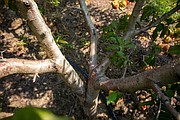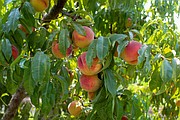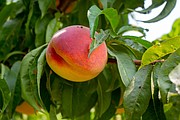It's just peachy: Tips on caring for fruit trees from an orchardist
It isn’t uncommon when traveling around the Columbia Basin to pass by a fruit tree or two, or even an entire orchard. Raising a fruit tree at home is popular, too, but there are plenty of things to consider to ensure the best bounty possible.
Heather Verhey is the orchard manager for Verhey’s Peaches in Royal City and has been around fruit trees pretty much her entire life. Her father, a teacher in Royal City in the 1960s, started some peach trees as a means to make some extra money before the operation blossomed into the orchard that sits on the Royal City hillside today.
Verhey said she’s been back in Royal City for about 10 years. She said the orchard is primarily peach trees, with a few nectarines, too. She said the two biggest factors to learn to deal with in the Columbia Basin almost go without saying: wind and lack of rain.
“We’ve got to protect from winds and we’ve got to make sure they have plenty of water; that’s very important,” Verhey said. “Of course, when it’s really windy, you can’t overwater because then your trees will fall down when it’s windy.”
She said growing a fruit tree isn’t easy, but Verhey’s Peaches is pretty old-fashioned and doesn’t use a lot of fancy techniques or equipment.
For peach trees, she said it’s a good idea to stake the trees down when they’re young to protect them from the winds. Verhey said the orchard tries to keep its peach trees on the smaller side to avoid using ladders. Since peaches are so delicate, she said she doesn’t want to risk damaging the fruits by carrying them up and down ladders in the orchard.
Verhey said trees should be established after about five years or so, once the roots have taken hold. A mature peach tree producing well would provide about 40 pounds of peaches one summer, Verhey said.
But she said it’s a good idea to pick off the fruit before it’s ready for the first few years.
“The tree is going to be putting a lot of its energy into making the fruit, and what we really want to do is support the tree during that growing stage,” Verhey said. “It is recommended to pull fruit off the first couple of years.”
She said the orchard also tries to prune the trees to allow for an open center in the middle. With branches off to the sides, an open center allows for increased sunlight and air flow for the tree. As the branches grow, she said it’s a good idea to not let too many fruits grow on a young branch and risk damaging the tree’s structure.
“The structure of your whole tree is being established at that young stage, you don’t want to mess up the structure of the tree by breaking off those branches,” Verhey said.
One of the biggest concerns for anyone interested in growing their own peach trees is peach leaf curl, a fungal-borne disease that can be detrimental to the blossoms, fruit, leaves and tree itself. By the time signs of peach leaf curl are visible, Verhey said there’s not a lot that can be done.
The best way to combat the fungal disease is a spray treatment, which Verhey said the orchard typically has done in the fall. Fall is the time to watch for peach leaf curl and is often overlooked by gardeners at home who might simply be ready to wrap up the growing season, she said.
Mold and mildew are issues she said the orchard deals with pretty frequently. Once the peaches are producing sugar, paired with the moisture and dew from the irrigation, Verhey said a perfect environment for mildew and mold is born.
Earwigs are the biggest pest concern she said the peach orchard deals with. While the earwigs will end up eating the peaches, Verhey said the biggest issue has been with the insects clogging up the irrigation system and damage to peach trees has been minimal.
She said the orchard will have some trees struggling due to frost some years, but doesn’t think it’s ever lost any trees due to the cold weather. In fact, she said peach trees are recommended for a certain period of “chilling days” each year.
Absurd heat, like temperatures seen this summer, are a bit unprecedented. Verhey said she followed the lead of apple orchards in the area and just left sprinklers on for cooling. While some crops have suffered due to the extreme heat, she said this year’s crop of peaches has been one of the best in years.
“Every year is different for us, but this year the peaches are just beautiful,” Verhey said.
Verhey said it’s a lot of “babying” raising a fruit tree and has seen plenty of people in her gardening groups online struggle to get their fruit trees to produce.
Maintaining the fruit trees year-round can be a hefty task, but is important. Protecting the tree from fungus and insects, pruning when necessary and making sure the branches are spaced out enough to allow peaches to grow are all important.







